
by Mannahattamamma (UAE) | Mar 19, 2014 | 2014, Computers, Cultural Differences, Culture, Education, Expat Life, Government, Homeschooling, Living Abroad, Multicultural, Older Children, Politics, Religion, School, Social Media, Traditions, UAE, USA
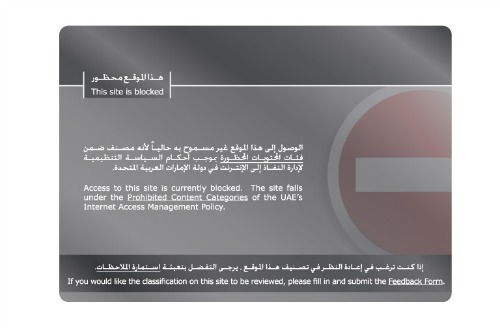 I always swore I would never home-school my children. I know many people do, and do it quite successfully, but I’m awfully fond of the quiet that descends on my house after they’ve tromped off to school. If that tromping were only happening from the bedroom to, say, the kitchen table, I think I might simply lock myself in the bathroom and never come out.
I always swore I would never home-school my children. I know many people do, and do it quite successfully, but I’m awfully fond of the quiet that descends on my house after they’ve tromped off to school. If that tromping were only happening from the bedroom to, say, the kitchen table, I think I might simply lock myself in the bathroom and never come out.
But as so often happens, my vow has collided with reality and I have found myself, in recent weeks, trolling home-schooling websites in search of teaching resources. My kids are now 9 (nine and a half, he would say indignantly) and 13; they go to a British school here in Abu Dhabi. That means they’ve spent a lot of time learning various English kings and queens, although they can’t recite them all in order. They study “maths,” and do prep rather than homework; they study English history and geography; they read mostly English writers in their literature classes. In addition to all those Anglo studies, they take Arabic language classes four days a week and once-weekly class called “Islamic Studies.” The Arabic classes are mandated by ADEC (Abu Dhabi Education Council) and I have to say, I’m much more interested in my kids learning Arabic than I am in their ability to name all the English kings and queens.
Having the boys be in an English system has been a learning curve for all of us. We’re learning two languages, actually, Arabic and, well, English: the boys now live in a world where things are “grey,” luggage goes in the “boot,” and we put garbage in the “bin.”
I’m not considering a dabble in the home-schooling system in order to beef up my boys’ appreciation of the Queen’s English, however. My kids, like every schoolchild in the country, have a curriculum that is at least in part determined by the UAE government, and that means there are things that aren’t supposed to be taught. I live in a place where censorship happens and where, unlike the States, the policies cannot be overtly challenged in the courts. So, for instance, in the States if you live in a town where they want to ban the Harry Potter books, you can take the school district to court. Not here.
We had to sign a permission slip so that our older son could get the science textbook that included the chapter on reproduction (with pictures of, you know, the embarrassing bits); his Latin class translates vinum as … grape, not wine. These are relatively small annoyances, although of course they are far from ideal.
There are, however, more serious concerns in terms of what shouldn’t be included in history courses and literature courses, and that’s where I find myself trolling the home-schooling sites for resources. The Holocaust can’t be taught here; Israel and Judaism are not supposed to be mentioned here; communism isn’t supposed to be discussed; evolution isn’t supposed to be taught; and the list goes on. Sometimes it feels as if we’re living in some kind of Bible-thumping town in the rural U.S and I realize, yet again, that fundamentalism can be seen as a global phenomenon that differs only in the nature of its prohibitions: the fear that motivates the prohibitions stays constant.
Before you leap to any conclusions, please know that the Muslim families I know are as frustrated by these government-issued edicts as are the non-Muslim families and many of us have talked together about what we can do to help our children gain a full picture of the world, regardless of what the government says. So it is that what in some contexts (living in Manhattan, for instance) would be a purely theoretical discussion has become in our household, a very pragmatic series of conversations.
Think about it: how would you talk to your kids about censorship? Is censorship always bad? Think about your children, if you have them, and the internet: are there sites you say they can’t see, or have you put a filter or something on your computer to prevent certain kinds of access? Do we agree that there is such a thing as “good” censorship? (Because of that whole teenage-boy-surfing-the-internet thing, I see a (slight) upside to living in a “nanny state.” I am fairly sure that if he wanted to look, my son wouldn’t be able to find basic porn–not to say that if he really wanted to dig around he couldn’t elude the censors, but at this point, I think his porn-directed vocabulary is still too limited to get around the government blocks. I guess we file that under “thank goodness for small favors,” right? )
My husband and I are both professors, and so we are able to bolster and supplement what isn’t happening in school, but we are also having a lot of conversations with our kids about censorship, politics, and the necessity of thinking about things in ways that are different from how we might think about them. We point out that the UAE isn’t Saudi Arabia; there is no Taliban here; the country is not governed by a theocracy of any sort. We know Jewish families who live here; I know gay couples who live here; a Mormon family lives next door to us. I see people on the beach in the scantiest of scanty bathing suits.
Living here means coming to term with nuance, with ambiguity, with living in a world that is organized around “both/and,” rather than “either/or.” The country is progressive and conservative; censorship is a problem that has a context; learning happens as much from what is not there as it does from what is there. It’s complicated and let’s be honest — no nine year old, no thirteen year old—and very few adults—really likes ambiguity. After all, if there is no “in-between” answer, life becomes much easier, doesn’t it?
No, of course I’m not happy that my kids have a biology textbook with the word “pig” marked out. Of course, I’m also not pleased that the Anglo-centric curriculum also neglects things like the US Civil War, other than in the most general sense. But I will say that I think it is, and will continue to be, a powerful learning experience for my children (and us) to have to confront and think about what it means to live in a place where the government attempts to exert such extensive control. I like to think that, paradoxically, these attempts at censorship will make my children more open-minded adults.
Have you ever been confronted with censorship? How have you dealt with it?
After twenty-plus years in Manhattan, Deborah Quinn and her family moved to Abu Dhabi (in the United Arab Emirates), where she spends a great deal of time driving her sons back and forth to soccer practice. She writes about travel, politics, feminism, education, and the absurdities of living in a place where temperatures regularly go above 110F.
Deborah can also be found on her blog, Mannahattamamma.
More Posts
Follow Me:


by Kyla P'an (Portugal) | Mar 4, 2014 | 2014, Awareness, Being Thankful, Education, Human Rights, Humanity, Inspirational, Interviews, Kids, Life Lesson, Motherhood, Older Children, Social Good, Social Media, Technology, USA, Womanhood, World Voice, Younger Children
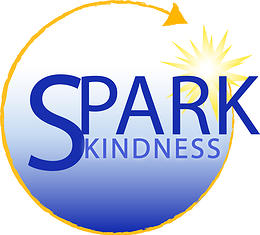 SPARK = Successful, Positive, Authentic, Resilient, Kids
SPARK = Successful, Positive, Authentic, Resilient, Kids
The moment you sit down with Christine Guthery, a funny transformation takes place, you find yourself swelling with optimism, self-confidence and personal-potential. It’s a gift Christine has, she simultaneously exudes these attributes and brings them out in others. She’s passionate about what she does and her enthusiasm has a way of igniting passion in others.
Christine is a lawyer by training but as the mother of three children (now ages 16, 9 and 7), she has discovered that her real calling is as a community activist and SPARK Kindness is community activism at its finest.
SPARK is the offshoot of a coalition called Parents against Bullying and Cyber-Bullying, which Christine founded in 2010, and its sister organization, the Metro-west [Boston] Anti-Bullying Coalition (ABC). The need for an anti-bullying coalition arose from a wide-spread, cyber-bullying incident at a local middle school, which impacted more than 90 students and their families in 2010.
Ironically, though neither Christine nor anyone in her family has ever been a victim of bullying, Christine is on a mission to prevent it. “Bullying is a social justice issue,” Christine says. “in order to rise above it, you have to be resilient, empowered, self-confident. I’m a lawyer by training and this idea of building resiliency inspires me. Everyone deserves to be treated with dignity and respect. That’s my cause.”
“The definition of ‘bully’ used to be pretty straightforward. It was a label once reserved for kids, who were considered outliers or playground thugs, the type of kids who committed physical acts on their victims. But times have changed. Now it’s not just the kids who are insecure or outcast that are doing the bullying, rather it’s also the popular kids, both boys and girls, who are trying to reach the top of their social/athletic/academic pyramid that can be the perpetrators,” Christine says.
“Not too long ago,” Christine continues, “a slanderous note passed around at school could impact a whole class of students or even a school community but when the kids went home at the end of the day, they left the incident at school. Now, with the Internet and smart phones, [and thanks to social media sites like Facebook, MySpace and Instagram,] bullying incidents can enter the cyber-sphere and quickly go viral. Kids have no way of leaving an incident behind them,” explains Christine. “In fact, these days, a great deal of bullying occurs during out-of-school-time.”
Christine believes that genocide and ethnic-cleansing—such as the ones that have occurred in Darfur, South Sudan and Nazi Germany—is “bullying taken to extreme measures.” And it’s really this mindset, this deep desire to eradicate the cause at it’s root, that has given rise to SPARK Kindness. The evolution came in 2012, when Christine realized that just talking about bullying wasn’t making progress.
“For two years [2010 & 2011] I had been focusing on bullying and trying to understand it better,” she says, “but then I realized, what if we shifted the conversation away from the outcome (bullying) and toward the prevention (nurturing kindness and resiliency)? What if our efforts were proactive rather than reactive?”
She compares this shift in mindset with the approach of Western medicine, where the focus is on addressing the illness, not on maintaining and promoting wellness. “I was finding that just talking about bullying was disempowering,” Christine reflects. “When I focused on the positives of resilience, kindness and courage, I felt empowered. It was exactly like the emotion of ‘elevation’ or self-transcendence that psychologist, Jonathan Haidt, described in his 2012 TED talk,” she says. “In other words, when you witness someone doing something positive or altruistic, it inspires you to do something positive or altruistic. This is where SPARK Kindness came from, how can we build the community we want rather than just address the ills we want to avoid?”
The answer:
teach children not just about kindness and emotional self-awareness early on but how to be resilient and seek support when they are feeling insecure or are suffering. SPARK Kindness, ignite positive change in your community.
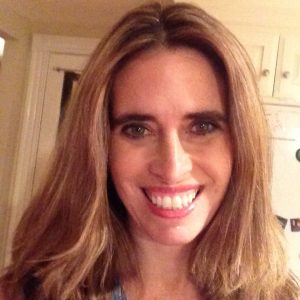 To find out ways to SPARK Kindness in your own community, click the logo above or visit http://www.sparkkindness.org/.
To find out ways to SPARK Kindness in your own community, click the logo above or visit http://www.sparkkindness.org/.
This post summarizes an interview between SPARK Kindness founder, Christine Guthery and World Moms Blog Managing Editor, Kyla P’an. This is a World Moms Blog exclusive interview.
Kyla was born in suburban Philadelphia but spent most of her time growing up in New England. She took her first big, solo-trip at age 14, when she traveled to visit a friend on a small Greek island. Since then, travels have included: three months on the European rails, three years studying and working in Japan, and nine months taking the slow route back from Japan to the US when she was done. In addition to her work as Managing Editor of World Moms Network, Kyla is a freelance writer, copy editor, recovering triathlete and occasional blogger. Until recently, she and her husband resided outside of Boston, Massachusetts, where they were raising two spunky kids, two frisky cats, a snail, a fish and a snake. They now live outside of Lisbon, Portugal with two spunky teens and three frisky cats. You can read more about Kyla’s outlook on the world and parenting on her personal blogs, Growing Muses And Muses Where We Go
More Posts - Website
Follow Me:


by Elizabeth Atalay | Feb 25, 2014 | 2014, Communication, Culture, Education, Older Children, Social Good
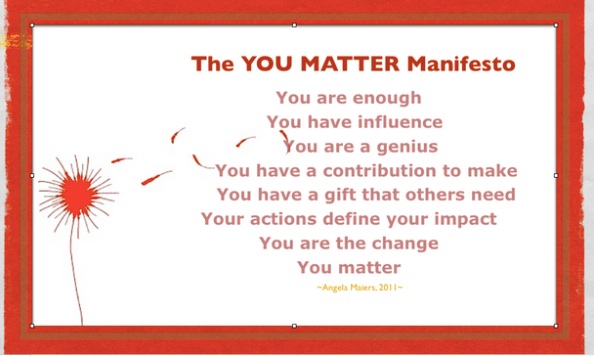
“You Matter”. The revelation that those two words can change the world seems so simple, so intuitive, yet those are not words that young people are used to hearing. Angela Maiers a long time educator, and founder of Choose2Matter decided that those two little words could be revolutionary. With her passion and enthusiasm behind the idea that we each have a unique genius to contribute, it is no wonder that her 2007 TEDx talk went viral. Thus the Choose2Matter movement was born.
“We were created for significance and one of the most dangerous things that can happen to us is the feeling that we don’t matter.”- Angela Maiers
Angela points out that she is not talking about an ego thing, studies show that feeling like you matter is a basic human need. The genius she sees in all of us is each individuals’ ability to problem solve from their own unique personal perspective. What started out as a digital community has now evolved into Choose2Matter Live events at schools across the U.S.A. In my mind perhaps no one needs to hear this more than high school kids who are in the process of self-discovery, so I was thrilled when the two-day Choose2Matter Live workshop came to my daughter’s public high school in Rhode Island.
The first thing the kids learned was the Choose2Matter Manifesto: You are enough, you have influence, you are a genius, you have a contribution to make, you have a gift that others need, your actions define our impact, you are the change, you matter. If they did not believe it before, they were now introduced to the idea that their voices and their actions can help others. The examples shown to this new group of kids of ways in which students have already made an impact through Choose2Matter are remarkable.
Honestly though, who doesn’t need to hear this manifesto? Even as adults the feeling that we matter is essential. This is an ideology that we frequently see first hand here at World Moms Blog, the power of one person, one idea brought to fruition, and how it can positively impact entire communities. Kristyn Zalota launched CleanBirth.org to provide safe birth for mothers in Laos, Alison Fraser started www.mom2momafrica to support the education of women and girls in Tanzania, and the founder of World Moms Blog Jennifer Burden created this global community of mothers from around the world when she couldn’t find what she was searching for online. These are just three examples of the many ways World moms Blog Contributors and Editors are using their passions and voices to make the world a better place. Their accomplishments inspire me to strive to do more in my own life, through their achievements I can see the possibilities when one puts their mind to solving a problem.
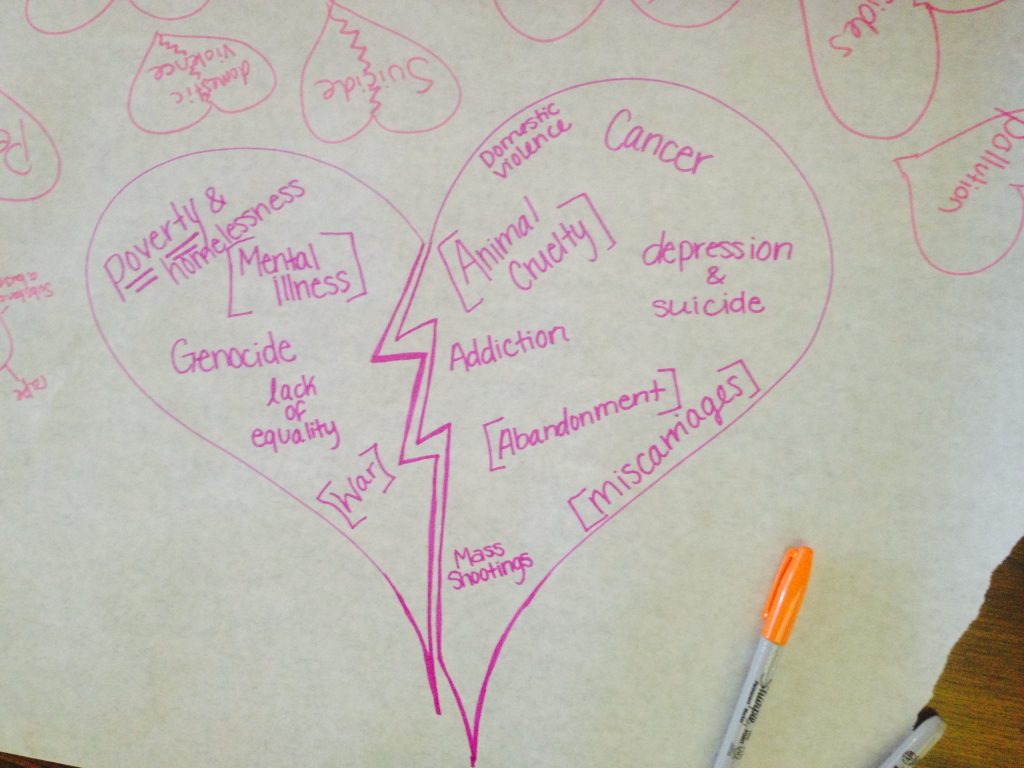
A Heart-Break Map
After the introduction, when the kids broke out into groups of “heart-break mapping” to narrow down what breaks their hearts about the world, and then come up with solutions of what they can do about it, my heart burst open. Kids narrowed down their heart breaks into solvable problems, some chose to be brave about sensitive issues they knew first hand to use their experience to try to help others. Due to a snow-day a room full of high school kids chose to voluntarily return to school on the saturday before vacation week to follow through on their ideas. It was truly amazing to watch these kids come together and talk through some of the major issues impacting society. I witnessed at least three new websites being born to begin to address some of their heart breaks , self-harm, depression, and body image issues for girls. These kids got it. As Angela and her colleague Mark told the kids, these ideas may not be the ones to solve a problem, but you are just building your muscles here, you are just getting started.
The lessons the kids at my daughter’s high school learned in those two days are sure to stay with them. The empowerment of knowing that they do matter, that they are capable of making a difference is huge. The students were left with the message that they are the ones who will need to come up with the answers to the world’s most pressing problems, because us adults just may not have all the answers. (But that is one thing I think all teenagers already seem know.)
This is an original post written for World Moms Blog by Elizabeth Atalay of Documama.
Do you have any great examples of the power of one person who made an impact to share?

Elizabeth Atalay is a Digital Media Producer, Managing Editor at World Moms Network, and a Social Media Manager. She was a 2015 United Nations Foundation Social Good Fellow, and traveled to Ethiopia as an International Reporting Project New Media Fellow to report on newborn health in 2014. On her personal blog, Documama.org, she uses digital media as a new medium for her background as a documentarian. After having worked on Feature Films and Television series for FOX, NBC, MGM, Columbia Pictures, Warner Brothers, 20th Century Fox, and Castle Rock Pictures, she studied documentary filmmaking and anthropology earning a Masters degree in Media Studies from The New School in New York. Since becoming a Digital Media Producer she has worked on social media campaigns for non-profits such as Save The Children, WaterAid, ONE.org, UNICEF, United Nations Foundation, Edesia, World Pulse, American Heart Association, and The Gates Foundation. Her writing has also been featured on ONE.org, Johnson & Johnson’s BabyCenter.com, EnoughProject.org, GaviAlliance.org, and Worldmomsnetwork.com. Elizabeth has traveled to 70 countries around the world, most recently to Haiti with Artisan Business Network to visit artisans in partnership with Macy’s Heart of Haiti line, which provides sustainable income to Haitian artisans. Elizabeth lives in New England with her husband and four children.
More Posts

by Fiona Biedermann (Australia) | Feb 24, 2014 | 2014, Oceania, Older Children, Social Media, World Motherhood
 The mere fact that you’re reading this blog post means you have some understanding of social media and how it works. In this day and age you can’t escape the reach of social media, it’s everywhere from Facebook and Twitter to blog posts and everything in between.
The mere fact that you’re reading this blog post means you have some understanding of social media and how it works. In this day and age you can’t escape the reach of social media, it’s everywhere from Facebook and Twitter to blog posts and everything in between.
Amazing things happen as a result of social media, families tracking down lost family members, people establishing support and advocacy for life changing programs at the blink of an eye, the ability to build and grow friendships and support networks across the world – social media is far reaching and rapid in its results.
As a parent though, social media can and should be terrifying.
For as quick as the good of social media duplicates and creates a movement it can also destroy and damage just as quickly. Reputations, lives, belief systems can all be damaged in the blink of an eye.
I was lucky in some ways, my children were teenagers at the very early onset of social media, so it didn’t impact largely on their early teenage years. As a mother though my mummy heart clenches with what I witness these days on Facebook and Twitter and what I see in the news.
Bullying drops to an all-time low when combined with the reach and anonymity that Facebook provides.
How, as a parent, do you combat this sort of rubbish when most of the time you may not even be aware it is happening? How do schools even get involved with what happens in the cyber world outside the school walls? Teenagers (our babies) are committing suicide because of on-line bullying which is sadly in the news too often these days.
The love of selfies and intimate photos which are shared on Facebook and Twitter amongst tweens and teens (and let’s face it even amongst adults). Something which is done on a whim, or a moment of little thought and once released are out there and never to be reined in again.
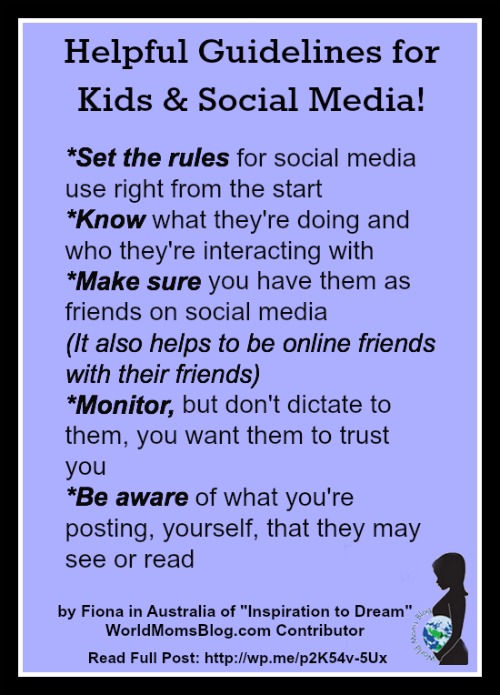
Future employers can locate this information, in fact anyone can access this information if they know where and how to look. No person should ever think that what they post is between them and their ‘friends’. I don’t know how many posts I see from parents and teachers posting messages ‘to prove how fast it can spread around the world’ to warn their children.
I read the most amazing post the other day by a mother which she sent to the friends of her child, I don’t know this woman nor her children, but boy did her post hit home and make me realise how important this new element of parenting is. I applaud this show of brave parenting.
You can read her post here.
I’ve always had my children as friends on Facebook, so that I know what they’re posting and what they’re doing. It’s not always an ideal solution because middle son has a tendency of un-friending me when drama is happening in his life. This is a warning in its self and now that he’s 20 I don’t have as much control, but at least it makes me ask questions.
My quick tips;
- Set the rules for social media use right from the start
- Know what they’re doing and who they’re interacting with
- Make sure you have them as friends on social media
- It also helps to be online friends with their friends
- Monitor but don’t dictate to them, you want them to trust you
- Be aware of what you’re posting yourself that they may see or read
I’d love to hear your thoughts on social media and what you do with your own children to keep them safe. My grandchildren are the next generation of social media users and I plan on being ready and armed to keep them safe in the cyber world.
This is an original World Moms Blog post by Inspiration to Dream of Adelaide, South Australia. Fiona is the writer of Inspiration to Dream and can be found writing or reading with every spare moment that isn’t filled up with work and her three boys, and of course with a bit of spare time thrown in for hubby as well.
The imageID: 3625818meets the download and usage requirements for Cliparto

Fiona at Inspiration to Dream is a married mother of three amazing and talented MM’s (mere males, as she lovingly calls them) aged 13, 16 and 22, and she became a nana in 2011!
She believes she’s more daunted by becoming a nana than she was about becoming a mother! This Aussie mother figures she will also be a relatively young nana and she’s not sure that she’s really ready for it yet, but then she asks, are we ever really ready for it? Motherhood or Nanahood. (Not really sure that’s a word, but she says it works for her.)
Fiona likes to think of herself as honest and forthright and is generally not afraid to speak her mind, which she says sometimes gets her into trouble, but hey, it makes life interesting. She’s hoping to share with you her trials of being a working mother to three adventurous boys, the wife of a Mr Fix-it who is definitely a man’s man and not one of the ‘sensitive new age guy’ generation, as well as, providing her thoughts and views on making her way in the world.
Since discovering that she’s the first blogger joining the team from Australia, she also plans to provide a little insight into the ‘Aussie’ life, as well. Additionally, Fiona can be found on her personal blog at Inspiration to Dream.
More Posts

by Roxanne (USA) | Feb 14, 2014 | 2014, Childhood, Cultural Differences, Divorce, Family, Kids, Motherhood, Older Children, Parenting, Rox is Brilliant, Single Mother, Unintentionally Brilliant, USA, World Motherhood, Younger Children
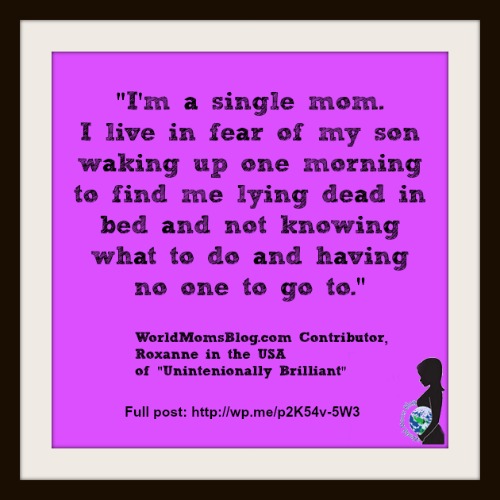
In a conversation with a friend the other day, she mentioned that someone once asked her if I was seriously okay with letting my 7-year-old go to the bathroom by himself. A little while later I read Mama B’s post about how her house is a dungeon of rules, and I suddenly felt extremely guilty for not imposing more rules on my son. (more…)
Roxanne is a single mother to a 9-year-old superhero (who was born 7 weeks premature), living in the biggest little city and blogging all about her journey at Unintentionally Brilliant. She works as a Program Coordinator for the NevadaTeach program at the University of Nevada, Reno. Roxanne has a B.A. in English from Sierra Nevada College. She has about 5 novels in progress and dreams about completing one before her son goes to high school.
More Posts - Website
Follow Me:


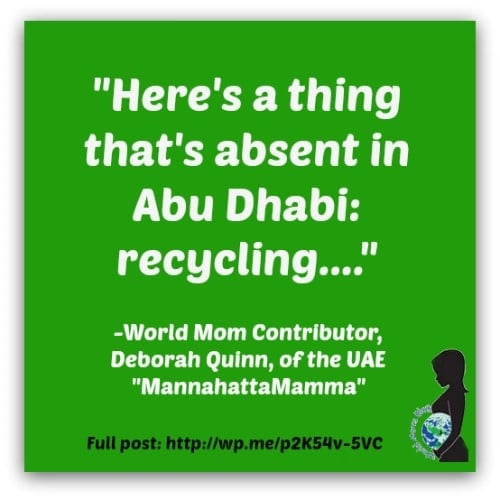
by Mannahattamamma (UAE) | Feb 12, 2014 | 2014, Education, Expat Life, Older Children, UAE, World Motherhood

I turned fifty last month.
See how calmly I said that? Just rolled right off my keyboard with nary a omigodhowdidigetsoold freakout.
Turning fifty in Abu Dhabi, where we’ve lived for the past three years, meant that my family couldn’t be with me to celebrate this milestone (millstone?). On the other hand, celebrating here in a place that still feels quite “new,” reminds me that I’ve avoided one of the big pitfalls of late middle age: falling into a rut. As a wise friend here pointed out to me, when you’ve just upped stakes and settled in a new country, culture, city, you’ve pretty much blown the “rut” wide open.
I’ve gotten used to many new things over our years here–buying Pop-tarts in the “pork room,” Sunday as the start of the work-week, no door-to-door postal service–but there are other things that feel more difficult to resolve, particularly when I think about what my kids are (or aren’t) learning as a result of living here. As with all things, of course, we start to figure out what really matters to us, as parents and as people, when we’re confronted with the absence of that thing.
Here’s a thing that’s absent in Abu Dhabi: recycling. Think about that for a minute, especially those of you who live in the US: think about the fact that it’s become almost second nature to separate your garbage, to flatten the cardboard, take the empty bottles back to the store, to look for products in environmentally-conscious packaging (unless that triples the price in which case…hmm…).
Not here. Oh sure, there are some “recycle” bins in public places, and in the housing development where we live, we have two garbage bins: one for “wet” garbage and one for “dry,” but we’ve watched as both bins get dumped, day after day, into the maw of the same truck. Plastic water bottles are ubiquitous but there isn’t anywhere to recycle them (which will explain why there are about 75 of them under my sink right now–and I think they’re breeding); gas-guzzling SUVs are the norm; and while there is talk about developing solar power here (in the land of eternal sunshine and heat you’d think that would be a no-brainer), nothing as yet has happened.
I use many of these problems as “teaching moments,” trying to explain to my kids about the importance of being environmentally conscious, but it’s been difficult to put anything into action, unlike when we lived in New York, where we took our compost to the farmer’s market to be turned into worm food, separated our trash, and so on.
And then for my birthday, my husband surprised me with two boxes. One was very small and contained things that sparkled. That box was just for me. The other box, much bigger and bulkier, contained a big plastic tub. Much less romantic, perhaps, but a gift for the whole family to–if not enjoy, then at least participate in: Bokashi.
Bokashi is a Japanese word that means fermentation, and bokashi is a method of composting food waste by sprinkling the scraps with “bokashi bran,” which encourages the fermentation process.
All our food scraps (meat, cheese, bread, coffee grounds) go into the bokashi bucket and when the bucket is full, we bury the contents of the bucket in our backyard (although there are other options; see the website for details).
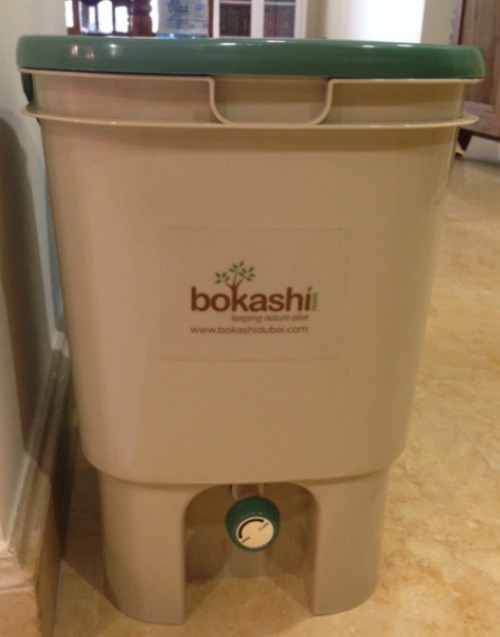
Now my kids have an additional chore: they are the food scrap patrol. Uneaten contents of lunchboxes don’t get dumped at school; they go into the bokashi. Dinner scraps, lunch bits, residue in cooking pots: bokashi, bokashi, bokashi. Not only does composting in this fashion show my boys how much food we throw away and (I hope) make them more mindful about food waste, the process going on inside the bucket is like an ongoing science lesson: molds and other micro-organisms, all right there in the kitchen bucket.
Will this at-home recycling help Abu Dhabi resolve its recycling crisis? Of course not, but at least we are teaching our children (I hope) that everyone can do a small something — and that if enough people do a small something, a Big Something might result. And that’s not a bad lesson –for kids or for fifty year olds.
Is recycling the norm in your country? What do you do to go “green” in your country?
This is an original post to World Moms Blog by Deborah Quinn in the United Arab Emirates of “Mannahattamamma.”
After twenty-plus years in Manhattan, Deborah Quinn and her family moved to Abu Dhabi (in the United Arab Emirates), where she spends a great deal of time driving her sons back and forth to soccer practice. She writes about travel, politics, feminism, education, and the absurdities of living in a place where temperatures regularly go above 110F.
Deborah can also be found on her blog, Mannahattamamma.
More Posts
Follow Me:


 I always swore I would never home-school my children. I know many people do, and do it quite successfully, but I’m awfully fond of the quiet that descends on my house after they’ve tromped off to school. If that tromping were only happening from the bedroom to, say, the kitchen table, I think I might simply lock myself in the bathroom and never come out.
I always swore I would never home-school my children. I know many people do, and do it quite successfully, but I’m awfully fond of the quiet that descends on my house after they’ve tromped off to school. If that tromping were only happening from the bedroom to, say, the kitchen table, I think I might simply lock myself in the bathroom and never come out.



















